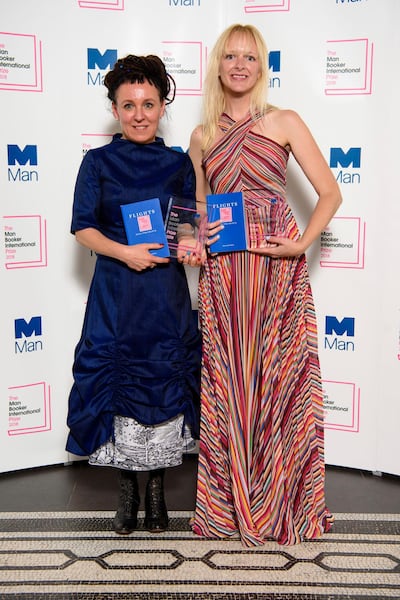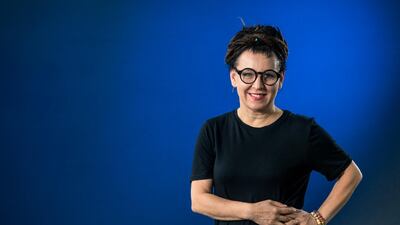Travel may well broaden the mind, but Olga Tokarczuk's travel-themed novel, Flights, stimulates it.
The acclaimed Polish author's book, winner of this year's Man Booker International Prize, eschews conventional narratives and standard plot arcs for an artful patchwork of discrete or interlinked tales, reflections, thoughts and beliefs. All relate to movement of some kind, to arrivals and departures, and to journeying across land or through time.
Tokarczuk has described it as “a modern travel book” and, more colourfully, a “constellation novel”, whereby she throws a range of writing and polyphonic voices into orbit and allows her readers to make significant forms and patterns from them.
After a century, it's time to change the novel, she says
"I wanted to do something new," Tokarczuk says. Almost everything that could be done with the novel in the last century was done, she believes. Authors now need different approaches, other kinds of storytelling.
This constant desire to reinvent is all too apparent throughout Tokarczuk's immensely varied body of work. So diverse is the handful of books available in English that she resists neat classification. House of Day, House of Night is, like Flights, a constellation novel comprising tall tales, ruminations and essays. Primeval and Other Times blends myth, allegory and family saga. And scheduled for publication in 2020, The Books of Jacob (what Tokarczuk calls "my magnum opus") is a sprawling 900-page epic chronicling a chapter of 18th-century Polish history.
Tokarczuk's latest book to appear in English is arguably her most surprising yet. The remarkable Drive Your Plow Over the Bones of the Dead can perhaps best be termed an existential whodunnit, or a metaphysical murder mystery. Its captivating protagonist and narrator is Janina Duszejko, a woman in her sixties who lives in semi-solitude in a hamlet on the Polish-Czech border. Used to spending her days in peace calculating horoscopes and translating the poems of William Blake, her world is turned upside down when one local man – the first of many – is found dead.
Janina turns sleuth and informs us that all the victims were hunters. She comes up with an outlandish theory as to why these men are being killed – “Animals are taking revenge on them for hunting” – but the police don’t want to know. But then one day they come for Janina.
Exploring the peripheries

Tokarczuk says that she had no plans to write a typical crime novel. “I wanted to explore this question, which is at the heart of the book: what can we do as good people against a law that is bad? Janina tries to behave like a good citizen but nobody listens to her. They think she is a madwoman and she becomes helpless.”
Janina is the latest in a long line of beguiling eccentrics in Tokarczuk's fiction. "Well let's look at the origin of that word," she says.
“Eccentric means out of the centre. It is concerned with peripheries. You know a Polish politician once described Poland as a doughnut – empty on the inside but interesting on the outside. Janina is eccentric because she can’t find a position in the middle, in the mainstream. She is excluded, provisional, marginalised, and therefore special.”
This novel reprises the frontier setting of House of Day, House of Night. "This idea of a borderland is very close to my mind," she says. "Between men and women, day and night. I am fascinated by this in-between."
The Polish-Czech border location is also the area that Tokarczuk calls home. “It is in Lower Silesia, a region we got at the end of the Second World War. My family were migrants who came there and settled. I think I still have this conflict – to be both rooted and nomadic.”
Her story, from therapist to telling tales
Tokarczuk was born in 1962. Her father wrote stories and her mother taught literature, so she grew up surrounded and influenced by books. But writing was not her first career choice. Before turning her hand to fiction she trained as a psychologist at the University of Warsaw then worked as a therapist in the field of addiction.
Rather than being a closed chapter, her past career ended up informing her writing. She remains interested in the work of Sigmund Freud and Carl Jung and cites both as creative influences. Her characters’ troubled mindsets and bleak outlooks ring true. If there are no well-rounded people in her books then it is because her art imitates life.
“I have never met anyone who wasn’t confused inside,” she says. “We have many contradictions, we are a collection of personalities. I think that’s our fate. Janina is like that. She has to use many defence mechanisms in her everyday life.”
When asked what attracted her to writing novels, she says: “The novel is a very sophisticated way of communication, much stronger than philosophical books. Well-written novels make you more empathetic towards other people. You can identify with someone who isn’t you. You can change your identity. A 14-year-old boy can become Anna Karenina. It is a miracle.
_______________
Read more:
Why George R R Martin's 'Fire & Blood' is a perfect stopgap for Game of Thrones fans
Social media and fake news: how the smartphone is transforming India
_______________
“Novels also show how similar we are to other people,” she says. “Novels can change attitudes.” She pauses and lowers her voice. “Maybe we should speak quietly otherwise politicians will use novels as propaganda.”
Along with novels, Tokarczuk has published collections of poems and short stories. For years she has been widely read and lauded in Europe. The Anglophone world has been slow to recognise her talent, but with luck her Booker win will raise her profile. In her native land, Tokarczuk enjoys commercial and critical success. Moreover, she has emerged as a notable feminist, an environmental activist, and a prominent critic of Poland's right-wing politics.
Some of her views have landed her in hot water. The 2017 film adaptation of Drive Your Plow called Spoor, for which she wrote the script, was branded anti-Christian and charged with promoting eco-terrorism. Tokarczuk was astonished by the response. "In Poland this book was not read as a funny book. I was disappointed. It is ironic and we are usually good with irony in Poland. Now we are so serious."
What's next for Tokarczuk?
A sinuous vein of humour runs through Tokarczuk's novels, even when her characters are ground down or thwarted by their confusion. There is comic madness and antic mayhem. Drive Your Plow gets off to an amusing start with a ludicrous confession from its memorable narrator: "I am already at an age and additionally in a state where I must always wash my feet thoroughly before bed, in the event of having to be removed by an ambulance in the night."
Tokarczuk also serves up a wealth of quirky observations (Holland, we learn in Flights, is a land where "people, convinced of their utter innocence, do not use curtains") together with bizarre descriptions (the flowers in Janina's neighbour's garden are "neat and tidy, standing straight and slender, as if they'd been to the gym").
Tokarczuk does not confine her dry wit and droll imagery to her writing. Asked about her restless capacity to experiment with the novel and her ability to produce something markedly different with each new book, she smiles. "You have the hedgehog, which can do only one thing to defend itself. And you have the fox, which can do so much more. I'm like a fox."
Towards the end of the interview, Tokarczuk squeezes in another charming analogy. "I think I always have many ideas for books in my head," she says. "It's like a forest full of mushrooms. Some are big, some are small."
After a while those ideas – or mushrooms – grow in size, edge out the others and begin to demand her attention. “I become obsessed by an idea,” she admits. “A miraculous moment comes when I go with my obsession.”
Tokarczuk is now 56. She claims to have six novels left in her.
“There is a queue of ideas in my head for those books. They are waiting for me. There is a small fight right now between two of them.
“When I get home and get back to my desk I will see which one it will be next.” She laughs. “Which one will become my new obsession.”

